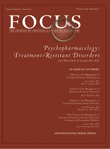Prediction of Antidepressant Response to Milnacipran by Norepinephrine Transporter Gene Polymorphisms
Abstract
Objective:
With a multitude of antidepressants available, predictors of response to different classes of antidepressants are of considerable interest. The purpose of the present study was to determine whether norepinephrine transporter gene (NET) and serotonin transporter gene (5-HTT) polymorphisms are associated with the antidepressant response to milnacipran, a dual serotonin/ norepinephrine reuptake inhibitor.
Method:
Ninety-six Japanese patients with major depressive disorder were treated with milnacipran, 50–100 mg/ day, for 6 weeks. Severity of depression was assessed with the Montgomery-Åsberg Depression Rating Scale. Assessments were carried out at baseline and at 1, 2, 4, and 6 weeks of treatment. The method of polymerase chain reaction was used to determine allelic variants.
Results:
Eighty patients completed the study. The presence of the T allele of the NET T-182C polymorphism was associated with a superior antidepressant response, whereas the A/A genotype of the NET G1287A polymorphism was associated with a slower onset of therapeutic response. In contrast, no influence of 5-HTT polymorphisms on the antidepressant response to milnacipran was detected.
Conclusions:
The results suggest that NET but not 5-HTT polymorphisms in part determine the antidepressant response to milnacipran.
(Reprinted with permission from the American Journal of Psychiatry 2004; 161:1575–1580)



